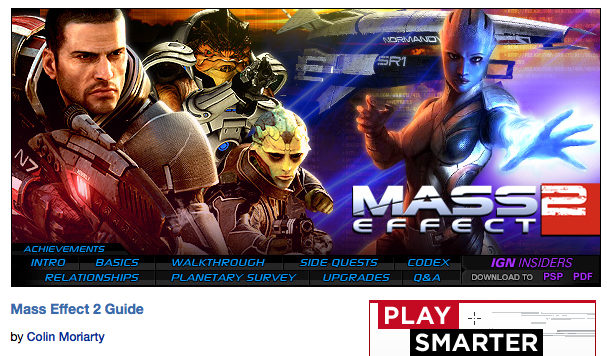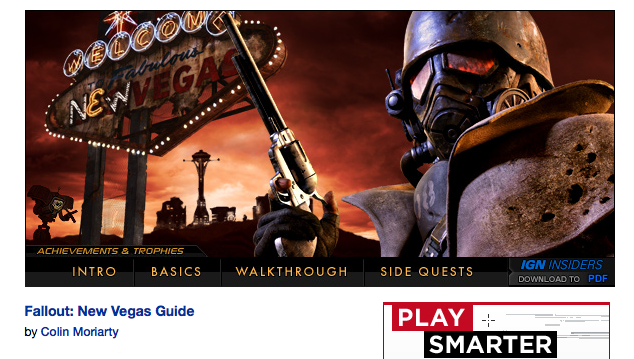 If you’ve listened to the IGN PlayStation Podcast (Beyond!), then you are very familiar with the former Guides Guru, Colin Moriarty. I have thought about asking him for an interview for awhile now, particularly to get his point of view on web vs. print guides, and when I heard he was moving from guides to editorials, I pretty much pounced on him on Twitter. Lucky for me, he didn’t take offense and agreed to do an interview.
If you’ve listened to the IGN PlayStation Podcast (Beyond!), then you are very familiar with the former Guides Guru, Colin Moriarty. I have thought about asking him for an interview for awhile now, particularly to get his point of view on web vs. print guides, and when I heard he was moving from guides to editorials, I pretty much pounced on him on Twitter. Lucky for me, he didn’t take offense and agreed to do an interview.
So without further ado, here’s a strategy guide writer interview from the world of online strategy guides: Colin “He-Only-Does-Everything” Moriarty.
1. How did you get into guide writing?
Back in January of 2000, I wrote my very first FAQ on GameFAQs for Mega Man on the NES. As gaming fansites really began to take off in the late 1990s, I got involved in some of them too, but eventually realized that my calling was to write technical manuals for old NES games. I did this for a couple of years, late during my high school days.
Thankfully, that segued into a freelance offer from IGN to write for IGN Guides. That happened in October of 2002. I freelanced for IGN throughout college (and even interned for a while), and when I graduated college in 2007, I got a full-time job there. And now, here I am (although I don’t write guides anymore as of January).
2. What elements do you like to personally ensure go into a guide?
I think it’s a legacy of my FAQ-writing days, but what’s most important in any guide is exhaustive detail. It’s not necessarily writing to the lowest common denominator, but rather making sure that any question a reader might have is answered for them before they can even ask it. Even if it’s a question you don’t think necessarily warrants an answer. You’d be surprised what confuses some people in any game.
I also think personality is important. Entertaining your reader might not be obvious in a technical guide, but I’ve gotten many compliments over the years for not sounding like a robot.
3. What do you think separates a great guide from a horrible one?
The same two things as in question #2 – exhaustive detail and personality. Organization is important, too. You have to answer all of the readers’ questions, but you have to make sure they know where to look for those answers.
There are a lot of horrible guides in both print and on the internet, and I think they speak for themselves. Half-assed, rushed, not full of the pertinent information. The authors do themselves a great disservice by even releasing them at all. I stand by everything I’ve written. I wonder if the authors of bad guides can say the same?
4. Can you take us through the general process of what it takes to develop and publish a guide on IGN?
We have several in-house guide editors, and then an army of freelancers that write everything we can’t do in-house. Each writer goes about his or her business in their own way, but for me, I like to jump right into the walkthrough, fleshing out the ancillary parts of the guide (like collectibles) as I go along. I wrap everything up with a robust Basics section, and then put it on the site. Naturally, we capture screens and video as we go.
As you may have noticed, we’ve segued in recent years from only putting our guides up when they’re done to putting them up incomplete, and then updating them as we go. The latter is useful for our readers, letting them know that we’re working on this guide, and also giving them information that they may find useful early or midway through the game.
5. How do you decide which games will get guides and which will not?
It’s easy, really. We only have so many writers, and so many resources. Only the biggest games, and the games we think will require the most help for the most readers get our attention. We’d love to write guides for every game released, but it’s simply not possible.
 6. It sometimes appears that IGN doesn’t really have a timetable when it comes to guide releases. Some guides are out on gameday release, and others appear in piecemeal over time. What is the general timeframe that you like to set for a guide’s release?
6. It sometimes appears that IGN doesn’t really have a timetable when it comes to guide releases. Some guides are out on gameday release, and others appear in piecemeal over time. What is the general timeframe that you like to set for a guide’s release?
We like to get our guides up as soon as we possibly can. But we also don’t want to sacrifice quality, and that’s something we put before everything else. It’s all about what we can get done when we can get it done in the most quality-oriented fashion possible. If a guide isn’t ready for primetime the day a game comes out, we don’t release it.
7. What is your biggest pet peeve when writing a guide?
I don’t really have one. When I left guides to become a regular editor at IGN, I went back and counted all of the IGN Guides I wrote. It was almost 100 in an eight year period. When you write that many strategy guides, you get into a groove. If anything, writing guides has made me more organized, a better writer, and prepared me for the unexpected time-sucks that all sorts of games can unexpectedly throw at you.
8. What do you like most about guide writing?
Guide writing is a process, and one that experienced guide writers get better and better at maneuvering through the more they write. What I really like is sitting down with a huge game – Mass Effect, or Red Dead Redemption, or Fallout 3 – and 500,000 words later seeing the end product. And of course, I love knowing that my hard work has paid off for gamers who found the help they need. Their continued e-mails of thanks are what make writing guides so rewarding.
9. Has guide writing affected how you view video games? In what way?
It’s certainly made me more of a perfectionist, more of a completionist. I rarely go through games just to beat them now. I like to see and do everything, find the collectibles, do side quests, earn all of the Trophies. Having to do that for so many guides just to make them as complete as possible has allowed me to explore a product in greater depth.
10. What is your favorite genre of game to play and what is your favorite to write about?
Back in the day, I was a huge J-RPG nerd. Now that that genre has effectively fallen off the cliff, I’ve in recent years become enamored with W-RPGs. Some of my favorite guides – Fallout 3 and New Vegas, Mass Effect 1 and 2, et cetera – are all of that genre. I also love sandbox games. Infamous comes to mind. And then there are shooters which I enjoy too. I’ve written all sorts of guides, and play all sorts of games, but I suppose my three favorite genres would be W-RPGs, Sandbox, and FPS. But honestly, I can find something to love in every genre.
11. Before you became the guides guru of IGN, where did you originally write and publish your guides?
I started off at GameFAQs. You can still find my guides there under the name CMoriarty. But my content has called IGN home since 2002.
12. Of all the guides you have written, which one is your favorite?
That’s a tough question. I think a lot of my guides since I became an editor have been top notch. My swan song on IGN Guides, New Vegas, is a guide I’m especially proud of. But really, there are probably a solid dozen guides that I look back on fondly.
13. Now which one do you think is the best?
I think the readers have pretty resoundingly answered that question: Fallout 3.
14. Do you have any advice for writers/gamers who would like to break into guide writing?
You have to have passion. You have to have focus. You have to have an eye for detail. And you have to have a lot of time. You need to be willing to write for no money to get your foot in the door, and you need to be willing to take the risk, put your name out there, and realize that it may or may not pan out for you.
If there’s one thing I’m well-aware of, it’s that while I had talent when IGN recruited me to freelance for them, I worked with a lot of talented writers who didn’t get that break over at GameFAQs. I’m blessed, and I was lucky, but not everyone is so fortunate.
Work hard, get your name out there, make great guides, and see where the cards fall.
15. In terms of online vs. print guides, what advantages and disadvantages do you see?
Print guides don’t really have an advantage. They’re dinosaurs. The only advantage the reader has in a print guide is expediency. Print outlets have access to games very, very early, so if a gamer needs help right away, print might be the only solution for them, since the final product is ready to go on day one.
But if you can wait a week (or even less), online alternatives will crop up that are almost always better written, more detailed and more useful than their print counterparts.
I still don’t understand why someone would spend $20 on a print guide. I’ve asked myself that question for over ten years.
16. Do you think that online guides are the way of the future and print guides are on their way out?
Absolutely. I’m surprised print guides are still going, to be honest. free alternatives.
17. Now for the hard question. What is your favorite video game of all time?
Oh, that’s easy. Mega Man 3 on the NES.
Thank you so much, Mr. Moriarty, for your time in answering this interview. However, I think I may have a couple of more questions for you, based on your responses:
- Do you think I’m crazy for buying print guides?
- Do you think my overall purpose for this site is crazy?
Please don’t answer them.


These images can be stored viewed on a monitor or printed on film. buy cialis pills
The main weakness would be communication. siphene buy no prescription